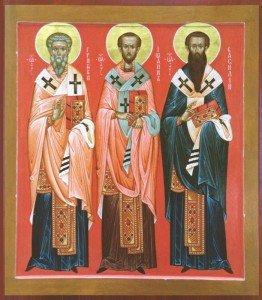 In the last issue I shared something about Basil’s early theology and how he impacted the Church’s understanding of certain elements in our doctrine on Jesus and God. Basil’s early theological writings reveal a thinker in constant development. It is important that a person look at some of his early correspondence with Apollinaris of Laodiucea, which is probably to be dated around 360-361. Basil wrote to Apollinaris asking how to interpret homoousios. He also states to Apollinaris that those who oppose any ousia language are motivated by hatred of homoousios, a hatred he does not appear to feel. Thus, Basil’s preference
In the last issue I shared something about Basil’s early theology and how he impacted the Church’s understanding of certain elements in our doctrine on Jesus and God. Basil’s early theological writings reveal a thinker in constant development. It is important that a person look at some of his early correspondence with Apollinaris of Laodiucea, which is probably to be dated around 360-361. Basil wrote to Apollinaris asking how to interpret homoousios. He also states to Apollinaris that those who oppose any ousia language are motivated by hatred of homoousios, a hatred he does not appear to feel. Thus, Basil’s preference
For Homoousian-sounding language does not occur because of deep antipathy to Nicaea. Rather, it seems to result from concern about the difficulty of understanding homoousios appropriately.
As you see, although the Father sought the appropriate words to express the divine mystery of the Trinity and Incarnation, they struggled with it. Basil had some reservations at first about the words chosen at Nicaea. There are two ways of understanding the problem Basil described in a letter to Apollinaris. On the one hand, Basil might have been expression an anti-Marcellan concern with homoousios. He might have argued that when we speak of ‘light from light’ we must speak clearly of two realities, each ‘light’ being ‘circumscribed’ as an individual reality; homoousios may imply that Father and Son are the same one light.
On the other hand, it has recently been suggested that there is another way of reading Basil’s concern. Homoousios is unacceptable because it implies the existence of two ultimate principles. This worry about the implications of homoousios has a long pedigree in the fourth century: we first encounter it with Arius’ charge that Alexander’s ‘always Father, always Son’ implies the existence of two principles.
What is the problem that Basil was facing? How can there be three separate persons in one being? How do we explain that? It was the same problem that the Church faced when it began dealing with the Incarnation. How can there be two individual beings in one Person.
Although this is a matter of faith, the Fathers struggled to find the appropriate way to express this truth. They found the words to express it but not prove it. The Trinity and the Incarnation are still a true and profound matter of faith.
